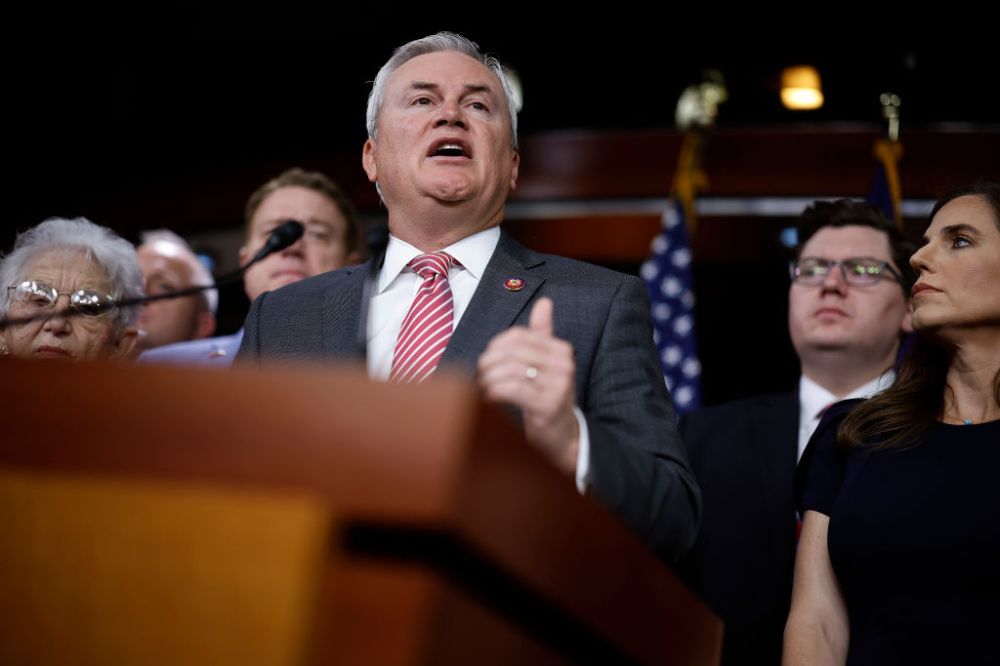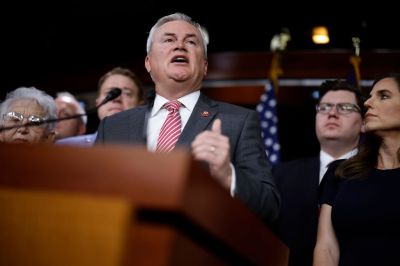Republicans and Democrats may vehemently disagree on the House GOP investigation into Hunter Biden’s business transactions, but they could—at least in principle—find common ground on an ethics bill inspired by the probe.
Rep. James Comer, chairman of the House oversight panel, said this week Republicans are considering legislation to require non-dependent family members of the president and vice president to disclose their finances to the public. The idea came as Republicans also announced the committee had obtained bank records showing more than $10 million from foreign sources flowed into various bank accounts tied to President Joe Biden’s family members between 2015 and 2017, raising concerns about influence-peddling. Republicans didn’t tie any of the transactions directly to the president, nor could they identify any instances in which the payments influenced official policy while Biden was vice president—but they said they are worried about the national security implications.
Imposing more robust reporting requirements for families of senior government officials sounds like a bill some Democrats would have supported during former President Donald Trump’s tenure, given the many business activities of Trump’s adult children—and it’s potentially a bill some Democrats could support today. But it may be a long shot: There’s no clear legislative text yet, and political acrimony amid the Hunter Biden investigation could make bipartisan collaboration a challenge.
Still, some Senate Democrats told The Dispatch this week they’re interested to hear the House GOP’s ideas.
“I see the merits of it,” Maryland Democratic Sen. Ben Cardin said of the potential bill. “I’d like to think about it a little bit more. When you see what’s happening in particularly the judicial branch of government, we know we need more disclosure. When you see what’s happening on campaign finance, we need more disclosure. So generally, I favor disclosure.”
Democratic senators interested in broadly addressing ethics concerns and expanding disclosure requirements “might want to try to see whether we can use that as a vehicle also to deal with some of these other issues we’re concerned about,” he added of the Republican plan.
Progressive Sen. Elizabeth Warren was also open to the idea.
“I always support strengthening ethics requirements in government, and I’d like to see what their proposal is,” she told The Dispatch.
Others, though, opted not to comment. “I haven’t seen it,” said Sen. Sheldon Whitehouse, who has in recent years pushed ardently for stronger ethics rules for the Supreme Court.
And Connecticut Democratic Sen. Chris Murphy said he wouldn’t weigh in on the idea until he’s reviewed the GOP bill.
Determining who would be covered by any new rules may be tricky. Under current transparency rules, candidates for president and vice president file initial financial disclosure forms after declaring they will run for office, followed by annual reporting while in office. These reports include information about the filer’s spouse and dependent children. Cardin raised a concern about a president’s or vice president’s non-dependent children who have no relationship with their parents. Would they be required to abide by disclosures?
Walter Shaub, a senior fellow at the Project on Government Oversight who led the Office of Government Ethics during former President Barack Obama’s second term, argued a bill targeting non-dependent family members may face legal challenges.
“I doubt a disclosure law like that would be constitutional with respect to a financially independent adult who is not responsible for the decision of their parent to go into government,” he said. He added that “the sponsors of the bill also may want to ask candidate Donald Trump if he would want this bill applied to his adult children if he becomes president again.”
Shaub said a better approach would focus on enhancing law enforcement tools to track illicit financial transactions.
House Republicans are looking into that issue as well. Staff on the oversight committee wrote they are seeking to strengthen anti-money laundering laws and analyze whether financial institutions have enough resources to thwart corruption.
They are also evaluating whether suspicious activity reports regarding personal and corporate bank accounts associated with a vice president’s or president’s immediate family members “should undergo a more rigorous banking compliance process, receive an expedited review by law enforcement without undue influence by political appointees, and be disclosed to Congress, under certain circumstances, given potential political corruption and risks to our national security,” according to the staff memo.
Republicans aren’t expected to introduce the legislation until further into their investigation, and potentially not until it concludes.
For More on Hunter
My colleague Price has a piece on the site today breaking down House Republicans’ Hunter Biden findings. He writes:
The memo includes a list of 21 Biden-family-adjacent companies formed between 1998 and 2017, 15 of which were created while Joe Biden was vice president. Some of these companies funneled money from foreign sources to members of the Biden family. One example of several: In 2015, a Romanian company called Bladon Enterprises paid roughly $180,000 to Robinson Walker LLC—Rob Walker’s business account. Over the next few days, Walker transferred $59,000 from the account to a personal account, and then again from his personal account to an account owned by Hunter Biden. That was just the beginning of a series of payments extending into 2017 in which Biden bank accounts received a total of approximately $1 million from Bladon Enterprises—a company owned by Gabriel Popoviciu, a Romanian businessman who was convicted of corruption charges in 2016.
Popoviciu had retained Hunter Biden as a lawyer in 2015, but the GOP lawmakers argue the payments from Bladon Enterprises were separate from that legal work.
Similarly, the Robinson Walker LLC account also served as a middleman account between State Energy HK Limited—a Shanghai-based energy company connected to an influential Chinese tycoon—and the Biden family. In March 2017, State Energy HK sent Robinson Walker LLC $3 million—and over the next few weeks, $1.065 million was wired from Robinson Walker LLC to at least five different Biden family accounts.
Read the full piece here.
House Republicans Advance Long-Stalled Immigration Bill
My colleague Harvest covered this week’s immigration debate in the House. After months of delay, the GOP conference finally coalesced behind an immigration package—one that has no chance of becoming law. She writes about some of the policy complaints that nearly derailed the bill, including E-Verify:
A few lawmakers from agricultural districts raised concerns about the package’s planned expansion of E-Verify, an optional federal program that allows employers to electronically verify whether someone is legally authorized to work in the country. The bill would have required all employers to use E-Verify. Reps. Mike Simpson of Idaho, David Valadao of California, and Dan Newhouse of Washington, among others, worried mandating the program would harm the agriculture industry, which relies heavily on immigrant labor.
GOP leadership cut a deal to include language that the Department of Homeland Security would consider and address “any adverse impact” on the industry’s workforce when implementing E-Verify requirements. Leaders also assured lawmakers they would further negotiate that aspect of the package with the Senate before anything goes to President Joe Biden’s desk. (The broader bill has no chance in the Democratic-controlled Senate, and the odds of a bipartisan immigration package passing this Congress are low. The White House has said Biden would veto the House GOP legislation.)
On Wednesday, Valadao said he would support the bill, citing leadership’s assurances on E-Verify. But some holdouts remained.
“E-verify is a federal bureaucracy between you and your right to work for a living,” Rep. Thomas Massie of Kentucky said. He ultimately voted against the bill Thursday.
Read her whole story here.






Please note that we at The Dispatch hold ourselves, our work, and our commenters to a higher standard than other places on the internet. We welcome comments that foster genuine debate or discussion—including comments critical of us or our work—but responses that include ad hominem attacks on fellow Dispatch members or are intended to stoke fear and anger may be moderated.
With your membership, you only have the ability to comment on The Morning Dispatch articles. Consider upgrading to join the conversation everywhere.